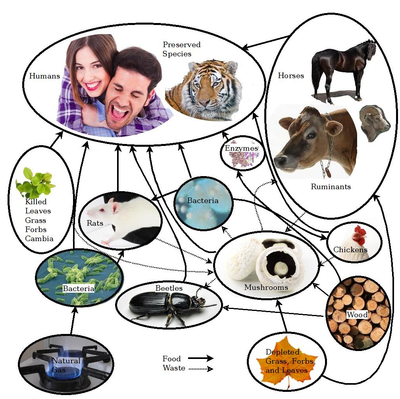
ALLFED is a nonprofit focused on feeding everyone in the case of a global catastrophe.
ALLFED plants[edit | edit source]
There are three categories of ALLFED plants:
- Those that are commonly cultivated now so we can get leaf protein concentrate from them right after a catastrophe. The top 30 are shown below, which go down to the bottom crops being 0.3% of the total global resource: wheat, rice, maize, alfalfa, sugarcane, mixedgrass, soybean, barley, forNES, maizefor, cotton, sorghum, grassNES, rapeseed, oilpalm, onion, groundnut (peanut), millet, sunflower, banana, rye, clover, oats, legumeNES, bean, cassava, potato, sugarbeet, grape, coconut (copra meal—left over from processing of coconuts to oil), and plantains.
- Cool tolerant crops that can be grown in the tropics in nuclear winter, and are also low cost per calorie: potato, sugarbeet, barley, wheat, and canola.
- Crops that would grow in greenhouses in nuclear winter tropics, which will probably be the non-cool tolerant crops for the rich (though rice and maize might not be too expensive).
Directory[edit | edit source]
Team Members[edit | edit source]
| Name | Position |
|---|---|
| David Denkenberger | Director & Co-founder, Assistant Prof. Mechanical Engineering |
| Ray Taylor | Co-founder, Food System Recovery & Preparedness |
| User:J.M.Pearce | |
| Sonia Cassidy | Director of Operations |
| Al Hundley | Director of Communications |
| Ariel Conn | Media & Communications Consultant |
| Gareth Jones | Crisis & Catastrophe Planning Consultant |
| Sahil Shah | Specialist Advisor |
| Tim Fist | Research Associate |
| James Throup | Research Associate |
| Aron Mill | Research Assistant |
| Juan García Martínez | Research Assistant |
| Ross Tieman | Research Associate |
| Amanda Cassidy | Operations Assistant |
| Maciej Pilachowski | HR Coordinator |
| Kyle Alvarado | Graduate Researcher |
| Megan Jamer | Communications Associate |
| Daisy Newbold-Harrop | Project Coordinator |
| Finan Adamson | Volunteer Consultant |
Board of advisors[edit | edit source]
| Name | Brief bio |
|---|---|
| Martin E. Hellman | Professor Emeritus Of Electrical Engineering At Stanford University |
| Jaan Tallinn | Founding Engineer of Skype and Kazaa |
| Anders Sandberg | Senior Research Fellow at the Future of Humanity Institute at the University of Oxford |
| Seán Ó hÉigeartaigh | Co-Director of the Cambridge Centre for the Study of Existential Risk (CSER) |
| Robin D. Hanson | Associate Professor of Economics at George Mason University
Research Associate at the Future of Humanity Institute |
| Carina Fearnley | Director of the UCL Warning Research Centre |
| Sella Nevo | Entrepreneur and Technologist |
| Prosenjit Ghosh | Associate Professor at Indian Institute of Science Bangalore |
| Peter Alexander | Senior Lecturer in Global Food Security at University of Edinburgh |
| Gorm Shackelford | Former Research Affiliate at CSER (Cambridge Centre for the Study of Existential Risk)
Post-doctoral Research Associate in Zoology at Cambridge |
| Dr Talib E. Butt | Senior Lecturer at the Northumbria University |
ALLFED Research[edit | edit source]

- Feeding Everyone No Matter What - The full book main page
- David Denkenberger and Joshua Pearce, Feeding Everyone No Matter What: Managing Food Security After Global Catastrophe , 1st Edition, Academic Press, 2015
- Free Preview: Google books
- Cover on Academia
- Facebook page
- Alternative Foods as a Solution to Global Food Supply Catastrophes
- Resilience to global food supply catastrophes
- Feeding Everyone if the Sun is Obscured and Industry is Disabled
- Cost-Effectiveness of Interventions for Alternate Food to Address Agricultural Catastrophes Globally
- Feeding Everyone: Solving the Food Crisis in Event of Global Catastrophes that Kill Crops or Obscure the Sun
- Food without sun: Price and life-saving potential
- Cost-effectiveness of interventions for alternate food in the United States to address agricultural catastrophes
- Micronutrient Availability in Alternative Foods During Agricultural Catastrophes
- Preliminary Automated Determination of Edibility of Alternative Foods: Non-Targeted Screening for Toxins in Red Maple Leaf Concentrate
- Open Source Software Toolchain for Automated Non-Targeted Screening for Toxins in Alternative Foods
- Scaling of greenhouse crop production in low sunlight scenarios
- Potential of microbial protein from hydrogen for preventing mass starvation in catastrophic scenarios
- U.S. Potential of Sustainable Backyard Distributed Animal and Plant Protein Production During & After Pandemics
- Global distribution of forest classes and leaf biomass for use as alternative foods to minimize malnutrition
- Long-term cost-effectiveness of interventions for loss of electricity/industry compared to artificial general intelligence safety
- Long term cost-effectiveness of resilient foods for global catastrophes compared to artificial general intelligence safety
- Rapid repurposing of pulp and paper mills, biorefineries, and breweries for lignocellulosic sugar production in global food catastrophes
- Nutrition in Abrupt Sunlight Reduction Scenarios: Envisioning Feasible Balanced Diets on Resilient Foods
- Methane Single Cell Protein: securing protein supply during global food catastrophes
- Killing two birds with one stone: chemical and biological upcycling of polyethylene terephthalate plastics into food
- How Easy is it to Feed Everyone? Economic Alternatives to Eliminate Human Nutrition Deficits
- Quantifying Alternative Food Potential of Agricultural Residue in Rural Communities of Sub-Saharan Africa
- Yield and Toxin Analysis of Leaf Protein Concentrate from Common North American Coniferous Trees
- Toxic Analysis of Leaf Protein Concentrate Regarding Common Agricultural Residues
- Towards Sustainable Protein Sources: The Thermal and Rheological Properties of Alternative Proteins
- How we can mine asteroids for space food
Additional Information[edit source]
- ALLFED
- Dave Denkenberger Publications
- OSE Wiki "Synfood" (i.e. protein and other dietary components from microbial organisms fed on gas or other hydrocarbons)
